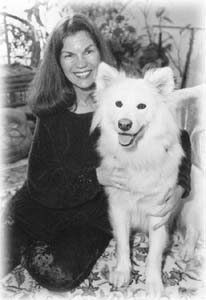![[MetroActive Features]](/gifs/feat468.gif)
![[MetroActive Features]](/gifs/feat468.gif)
[ Sonoma County Independent | MetroActive Central | Archives ]
Pleasure Rut
Photo by Janet Orsi
Tantra, love, and the big death
By Gretchen Giles
MEREDYTH YATES was doing what every other liberated, exuberant, and attractive young woman in Boston was doing in 1966. She was making love. Astride her partner, she enthusiastically pursued their congress, conscious of how she looked while she made love with him, conscious of her appeal, focused on the expectations of pleasure.
Finally her partner spoke.
"Would you please relax," he asked, wearily.
"I lay down, and I was quite embarrassed, because I thought I was being so sexy," Yates recalls, seated in her Santa Rosa home. "And I think that it was this embarrassment that diminished my ego."
Supine next to her partner, too shamed to speak, Yates began simply to breathe. Gradually, the rhythm of her breath joined the rhythm of his, and the two entered a state of suspended consciousness in a renewed lovemaking that Yates can only describe as being mystical. In fact, she passed out.
"I was very naive," Yates recounts, "and the next morning I asked him if he had experienced anything unusual the night before. He said, 'Do you think that you could do something like that by yourself? It's called tantra.'"
Yates hied herself right off to the library to study tantra. She found one book. But she knew that she was on to something. "It was certainly better than any 'Big O' I'd ever had in my life," she smiles.
"I started to have [this experience] on more than one occasion, and I started paying attention to the circumstances. I started developing what I found to be the magic ingredients," says Yates, a specialist in the Chinese feng shui method of home harmony who lectures on sexuality. "I call them the secret keys to the mystical, sexual experience."
The biggest secret of all is that Yates advocates intense lovemaking in which devoted partners mesh in a spiritually and physically intimate manner and no one ever has an orgasm unless they're purposefully making babies. Think that sounds like some kind of adolescent's nightmare cooked up by priests and mothers? Think again.
"One of my keys is to see the divine in your partner," Yates says. "Your partner is the beloved. There is intercourse, but no thrusting, no effort at creating genital fire. What people notice is that when they stop focusing on their genitals, their whole bodies start to get involved, and people are connecting in ways that are absolutely divine. It gets so that, through a glance, you can have this orgasmic multicellular experience.
"It's my conviction that it's our birthright," she continues firmly. "I think we all deserve to be connected to the ineffable."
Culled from ideas of egolessness and heightened awareness found in the Hindu, Taoist, and Buddhist traditions, Yates' form of tantra relies as well on a Victorian notion known as Karezza, the Italian word for embrace.
Espoused by one Dr. Alice B. Stoockham in her Ethics of Marriage manual, published in 1896, Karezza advocates that partners take vows of essential celibacy within marriage, ejaculating only for procreative purposes, and harnessing their energies away from their genitals, allowing the power of desire to flood their entire bodies. Reports are that when those couples who practiced Karezza came together in a darkened room, electrical sparks could be seen literally flying from their bodies.
"The real secret is the dissolution of the ego," Yates says, "because the ego wants fulfillment. Orgasms are fine, I'm not against orgasms--but the body is demanding. It wants another one, because it isn't the ultimate fulfillment. We think that if we have a bigger orgasm, we'll get closer. I don't think that's the way.
"Spend some serious time together without getting involved in that sexual fire, but rather getting involved in intimate sharing," says Yates, who advises that couples spend at least three days cut off from their ordinary world together. Three glorious days in bed, doing nothing but offering massages, looking into each other's eyes, bathing each other, breathing in rhythm, and feeding each other from food kept near the bed. Make love as it moves you, but, um, don't move too much.
"The orgasm is sometimes called the 'little death,'" Yates smiles. "This is the big death. The little death is over in a second. When you lose your ego, and really dissolve so that your mind is not here, when you merge into your partner and then into something that isn't even your partner, you don't know if you're coming back. It's like the ultimate drug experience.
"If you can have three days of really focusing on each other and maintain these spaces for each other, you've learned to surf, and then you can surf for life."
But you have to be willing to die big rather than little.
"In my opinion, that's a prerequisite," Yates affirms. "And not just for three days. If you're not willing to give up your orgasm, you're not going to be willing to give up your ego. It's that simple. You're not going to be willing to die. And you have to be willing to surrender so that at some level you do die: all the ideas of what you thought you wanted, or what you thought [sex] was, have died."
This page was designed and created by the Boulevards team.

Just Say No: Mystical sexologixt Meredyth Yates deflates the big O.
From the February 6-12, 1997 issue of the Sonoma County Independent
Copyright © 1997 Metrosa, Inc.